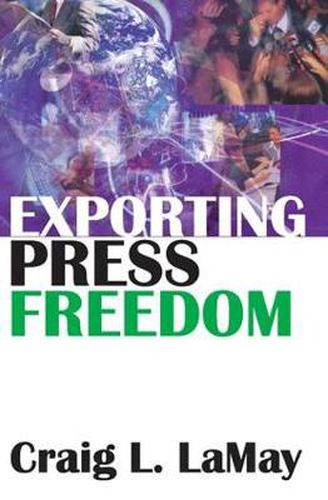Readings Newsletter
Become a Readings Member to make your shopping experience even easier.
Sign in or sign up for free!
You’re not far away from qualifying for FREE standard shipping within Australia
You’ve qualified for FREE standard shipping within Australia
The cart is loading…






International media assistance is a small but important form of international democracy-promotion aid. Media assistance boomed after the 1989 transitions in Central Europe, but now flows to virtually all regions of the world. Today the media assistance industry is focused on the problem of sustainability: How are free and independent public affairs media supposed to maintain their editorial mission while facing hostile political systems or the demands of the consumer marketplace? Many media in developing countries have been or are grant-dependent. When grants are exhausted or withdrawn, media that were funded to further democratic consolidation typically wither and die. Some become mere grant chasers. Others abandon public service to the demands of market competition, or political patronage. As a result, governmental and non-governmental grant makers now emphasize the need for sustainability in considering grants in the media sector. Many grant recipients have grown frustrated, sometimes bitter, and have sought to take a much more active role in the way assistance programs are put together. Just how is sustainability to be achieved while also ensuring a public-service editorial mission? Exporting Press Freedom examines the history and practice of media assistance, and argues that the dilemma of media independence and sustainability is best understood as an economic problem rather than one of poor editorial standards or lack of will. It includes profiles of news and public affairs media in developing and democratizing countries, and also of two non-governmental organizations that have pioneered the use of low-interest loans in media assistance. These profiles exemplify strategic and entrepreneurial approaches to developing and supporting public service media. Such approaches may be of use not only in the developing world, but in the consolidated Western democracies as well, where concern has grown about poor journalistic performance and its consequences for democratic governance.
$9.00 standard shipping within Australia
FREE standard shipping within Australia for orders over $100.00
Express & International shipping calculated at checkout
International media assistance is a small but important form of international democracy-promotion aid. Media assistance boomed after the 1989 transitions in Central Europe, but now flows to virtually all regions of the world. Today the media assistance industry is focused on the problem of sustainability: How are free and independent public affairs media supposed to maintain their editorial mission while facing hostile political systems or the demands of the consumer marketplace? Many media in developing countries have been or are grant-dependent. When grants are exhausted or withdrawn, media that were funded to further democratic consolidation typically wither and die. Some become mere grant chasers. Others abandon public service to the demands of market competition, or political patronage. As a result, governmental and non-governmental grant makers now emphasize the need for sustainability in considering grants in the media sector. Many grant recipients have grown frustrated, sometimes bitter, and have sought to take a much more active role in the way assistance programs are put together. Just how is sustainability to be achieved while also ensuring a public-service editorial mission? Exporting Press Freedom examines the history and practice of media assistance, and argues that the dilemma of media independence and sustainability is best understood as an economic problem rather than one of poor editorial standards or lack of will. It includes profiles of news and public affairs media in developing and democratizing countries, and also of two non-governmental organizations that have pioneered the use of low-interest loans in media assistance. These profiles exemplify strategic and entrepreneurial approaches to developing and supporting public service media. Such approaches may be of use not only in the developing world, but in the consolidated Western democracies as well, where concern has grown about poor journalistic performance and its consequences for democratic governance.